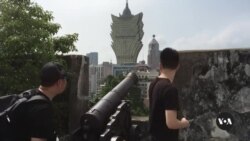Is Macao's unique heritage fading away?
Welcome to VOA Asia Weekly. I'm Chris Casquejo in Washington. That story is coming up, but first, making headlines:
Myanmar’s National Defense and Security Council agreed on Wednesday to extend a state of emergency by six months, the junta said. This again delays elections the ruling military has promised to hold.
A Thai court ruled Wednesday that the Move Forward party violated the constitution with its pledge to amend the nation’s lèse-majesté law. Observers say the ruling is expected to trigger a wider effort by opponents to seek dissolution of the party that won a parliamentary majority last year.
Billionaire Sultan Ibrahim Iskandar ascended to the throne as Malaysia's new king on Wednesday. He was sworn in for a five-year term under a unique rotating monarchy system. As the ruler of Johor state bordering Singapore, it was his turn to become king according to the rotational order established for rulers of the country’s nine states.
Vietnam and the Philippines agreed on Tuesday to boost cooperation among their coast guards and to prevent unexpected incidents in the South China Sea. Philippines’ President Ferdinand Marcos Junior announced the deal during a state visit to Hanoi. The two Southeast Asian countries have competing claims over parts of the South China Sea. China claims virtually all of the disputed waterway.
North Korea's official state news agency KCNA on Wednesday released still photographs of its latest missile test, saying the pictures were of a strategic cruise missile drill on Tuesday. The latest test for the missile called "Hwasal-2" marks the third time Pyongyang has tested cruise missiles in less than a week. A Hong Kong court on Monday ordered the liquidation of China's property giant Evergrande. The firm said it would continue to operate despite being hundreds of millions of dollars in debt following the country’s yearslong real estate crisis.
Macao is known as “the Las Vegas of Asia,” with a huge gaming industry in glitzy casinos. It is also home to a unique ethnic group - the Macanese. 25 years after the former Portuguese colony’s handover to China, however, there is worry among the Macanese and others that a part of Macao’s unique identity is fading away, as VOA’s Cindy Sui explains.
Cozinha Aida is a restaurant with generations-old recipes, preserved and passed down. The eatery is a place to enjoy some home cooking of Macao’s Portuguese-Chinese mixed-race population, known as Macanese. And it is named after its founder, the grandmother of Ivone de Jesus.
“The special thing about Macanese people is because Macanese people usually speak a few languages ... Portuguese, Macanese ... and like my grandma, she’s one of the 50 people who actually maintains the dying language called Patua.”
The Macanese say their identity is unique, from the languages they speak – a mixture of Cantonese, Portuguese and English – as the main ingredients, to the food and its fusion of Portuguese and Chinese cuisine.
But the Macanese and Portuguese populations in Macao are seeing a threat to their unique culture.
Although the latest census conducted in 2021 showed the number of people in Macao who are either full or mixed Portuguese has increased by nearly 5,000 compared to 2011 and 2001, shortly after the handover, it’s still just under 2 percent of Macao’s population of about 680,000, according to official statistics.
The Portuguese population, which also makes Macao unique, is also expected to decline.
The government has stopped giving preferential treatment to people from Portugal who want to live and work in Macao. They’re now treated like other foreigners, given a temporary work permit if they have a job.
“This means our Portuguese culture will be weak for the next generation. All we’ll see will be the architecture built by the Portuguese people, such as the fortress, but they won’t know the real story. It will be no different from another province in China without such things.”
But while cultural heritage sites such as this fortress are being protected, and Portuguese is an official language here, along with Chinese, Macanese residents fear as time passes and with a decline in their population, they will lose their language and culture – something they say is crucial to keeping Macao’s uniqueness alive.
Cindy Sui, VOA News, Macao.
Visit voanews.com for the most up-to-date stories.
I’m Chris Casquejo. We leave you now at a ceremony in Washington, DC commemorating the 80th anniversary of the World War II Battle of Kwajalein in the Marshall Islands. More than 8 thousand Japanese troops died in that battle.
Thanks for watching VOA Asia Weekly.











